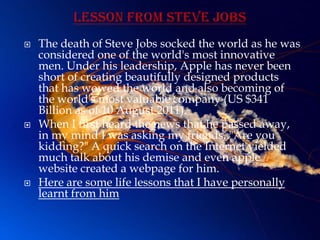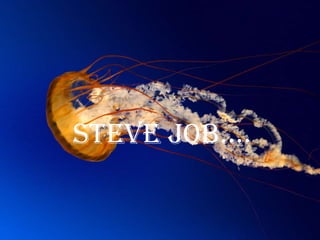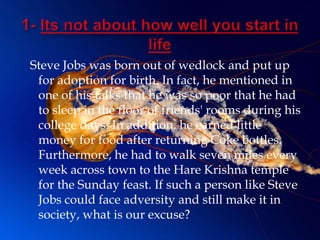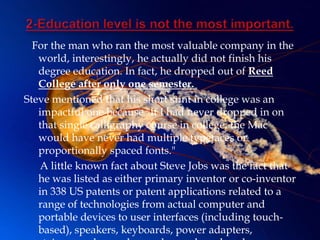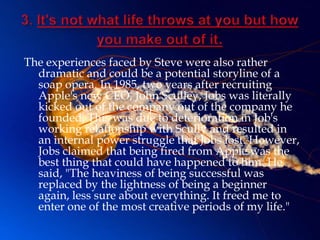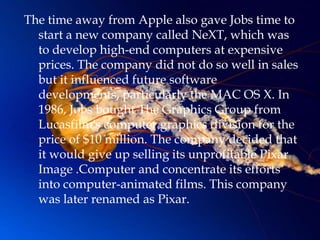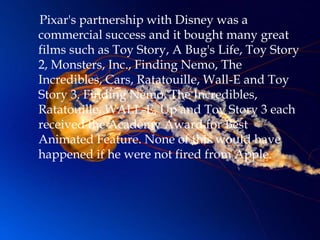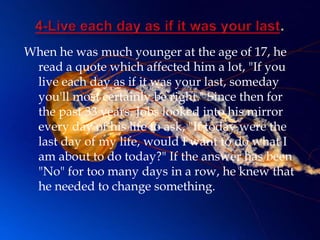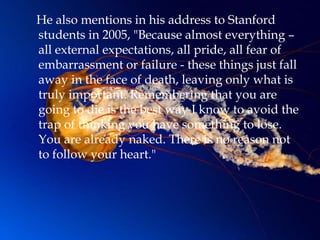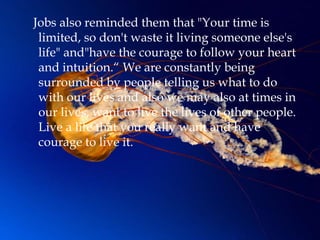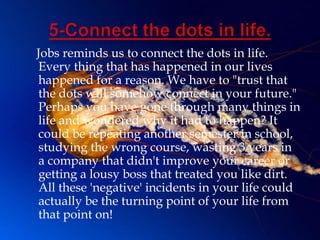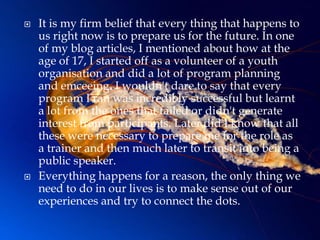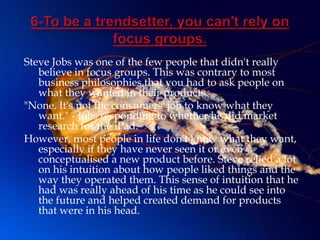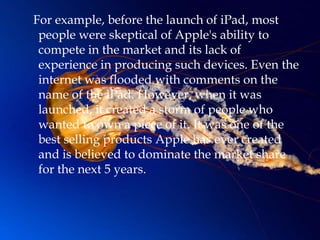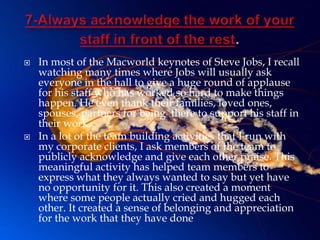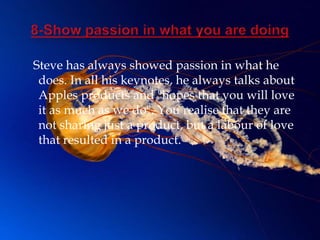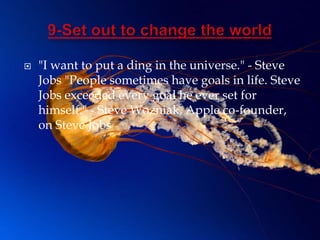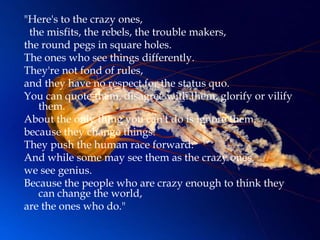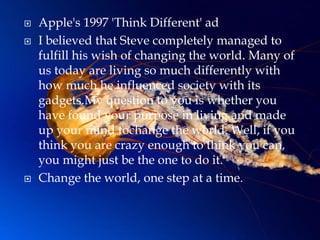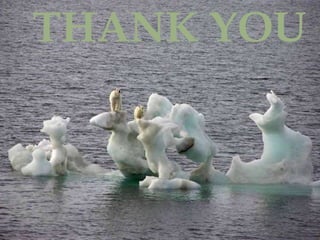Lesson from steve jobs
- 1. ÔÇ® The death of Steve Jobs socked the world as he was considered one of the world's most innovative men. Under his leadership, Apple has never been short of creating beautifully designed products that has wowed the world and also becoming of the world's most valuable company (US $341 Billion as of 10 August 2011). ÔÇ® When I first heard the news that he passed away, in my mind I was asking my friends, "Are you kidding?" A quick search on the Internet yielded much talk about his demise and even apple website created a webpage for him. ÔÇ® Here are some life lessons that I have personally learnt from him
- 3. Steve Jobs was born out of wedlock and put up for adoption for birth. In fact, he mentioned in one of his talks that he was so poor that he had to sleep in the floor of friends' rooms during his college days. In addition, he earned little money for food after returning Coke bottles. Furthermore, he had to walk seven miles every week across town to the Hare Krishna temple for the Sunday feast. If such a person like Steve Jobs could face adversity and still make it in society, what is our excuse?
- 4. For the man who ran the most valuable company in the world, interestingly, he actually did not finish his degree education. In fact, he dropped out of Reed College after only one semester. Steve mentioned that his short stint in college was an impactful one because "If I had never dropped in on that single calligraphy course in college, the Mac would have never had multiple typefaces or proportionally spaced fonts." A little known fact about Steve Jobs was the fact that he was listed as either primary inventor or co-inventor in 338 US patents or patent applications related to a range of technologies from actual computer and portable devices to user interfaces (including touch- based), speakers, keyboards, power adapters,
- 5. The experiences faced by Steve were also rather dramatic and could be a potential storyline of a soap opera. In 1985, two years after recruiting Apple's new CEO, John Sculley, Jobs was literally kicked out of the company out of the company he founded. This was due to deterioration in Job's working relationship with Scully and resulted in an internal power struggle that Jobs lost. However, Jobs claimed that being fired from Apple was the best thing that could have happened to him. He said, "The heaviness of being successful was replaced by the lightness of being a beginner again, less sure about everything. It freed me to enter one of the most creative periods of my life."
- 6. The time away from Apple also gave Jobs time to start a new company called NeXT, which was to develop high-end computers at expensive prices. The company did not do so well in sales but it influenced future software developments, particularly the MAC OS X. In 1986, Jobs bought The Graphics Group from Lucasfilm's computer graphics division for the price of $10 million. The company decided that it would give up selling its unprofitable Pixar Image .Computer and concentrate its efforts into computer-animated films. This company was later renamed as Pixar.
- 7. Pixar's partnership with Disney was a commercial success and it bought many great films such as Toy Story, A Bug's Life, Toy Story 2, Monsters, Inc., Finding Nemo, The Incredibles, Cars, Ratatouille, Wall-E and Toy Story 3. Finding Nemo, The Incredibles, Ratatouille, WALL-E, Up and Toy Story 3 each received the Academy Award for Best Animated Feature. None of this would have happened if he were not fired from Apple.
- 8. When he was much younger at the age of 17, he read a quote which affected him a lot, "If you live each day as if it was your last, someday you'll most certainly be right." Since then for the past 33 years, Jobs looked into his mirror every day of his life to ask, "If today were the last day of my life, would I want to do what I am about to do today?" If the answer has been "No" for too many days in a row, he knew that he needed to change something.
- 9. He also mentions in his address to Stanford students in 2005, "Because almost everything – all external expectations, all pride, all fear of embarrassment or failure - these things just fall away in the face of death, leaving only what is truly important. Remembering that you are going to die is the best way I know to avoid the trap of thinking you have something to lose. You are already naked. There is no reason not to follow your heart."
- 10. Jobs also reminded them that "Your time is limited, so don't waste it living someone else's life" and"have the courage to follow your heart and intuition.“ We are constantly being surrounded by people telling us what to do with our lives and also we may also at times in our lives, want to live the lives of other people. Live a life that you really want and have courage to live it.
- 11. Jobs reminds us to connect the dots in life. Every thing that has happened in our lives happened for a reason. We have to "trust that the dots will somehow connect in your future." Perhaps you have gone through many things in life and wondered why it had to happen? It could be repeating another semester in school, studying the wrong course, wasting 3 years in a company that didn't improve your career or getting a lousy boss that treated you like dirt. All these 'negative' incidents in your life could actually be the turning point of your life from that point on!
- 12. ÔÇ® It is my firm belief that every thing that happens to us right now is to prepare us for the future. In one of my blog articles, I mentioned about how at the age of 17, I started off as a volunteer of a youth organisation and did a lot of program planning and emceeing. I wouldn't dare to say that every program I ran was incredibly successful but learnt a lot from the ones that failed or didn't generate interest from participants. Later did I know that all these were necessary to prepare me for the role as a trainer and then much later to transit into being a public speaker. ÔÇ® Everything happens for a reason, the only thing we need to do in our lives is to make sense out of our experiences and try to connect the dots.
- 13. Steve Jobs was one of the few people that didn't really believe in focus groups. This was contrary to most business philosophies that you had to ask people on what they wanted in their products. "None. It's not the consumers' job to know what they want." - Jobs responding to whether he did market research for the iPad. However, most people in life don't know what they want, especially if they have never seen it or even conceptualised a new product before. Steve relied a lot on his intuition about how people liked things and the way they operated them. This sense of intuition that he had was really ahead of his time as he could see into the future and helped created demand for products that were in his head.
- 14. For example, before the launch of iPad, most people were skeptical of Apple's ability to compete in the market and its lack of experience in producing such devices. Even the internet was flooded with comments on the name of the iPad. However, when it was launched, it created a storm of people who wanted to own a piece of it. It was one of the best selling products Apple has ever created and is believed to dominate the market share for the next 5 years.
- 15. ÔÇ® In most of the Macworld keynotes of Steve Jobs, I recall watching many times where Jobs will usually ask everyone in the hall to give a huge round of applause for his staff who has worked so hard to make things happen. He even thank their families, loved ones, spouses, partners for being there to support his staff in their work. ÔÇ® In a lot of the team building activities that I run with my corporate clients, I ask members of the team to publicly acknowledge and give each other praise. This meaningful activity has helped team members to express what they always wanted to say but yet have no opportunity for it. This also created a moment where some people actually cried and hugged each other. It created a sense of belonging and appreciation for the work that they have done
- 16. Steve has always showed passion in what he does. In all his keynotes, he always talks about Apples products and "hopes that you will love it as much as we do". You realise that they are not sharing just a product, but a labour of love that resulted in a product.
- 17. ÔÇ® "I want to put a ding in the universe." - Steve Jobs "People sometimes have goals in life. Steve Jobs exceeded every goal he ever set for himself." - Steve Wozniak, Apple co-founder, on Steve Jobs
- 18. "Here's to the crazy ones, the misfits, the rebels, the trouble makers, the round pegs in square holes. The ones who see things differently. They're not fond of rules, and they have no respect for the status quo. You can quote them, disagree with them, glorify or vilify them. About the only thing you can't do is ignore them, because they change things. They push the human race forward. And while some may see them as the crazy ones, we see genius. Because the people who are crazy enough to think they can change the world, are the ones who do."
- 19. ÔÇ® Apple's 1997 'Think Different' ad ÔÇ® I believed that Steve completely managed to fulfill his wish of changing the world. Many of us today are living so much differently with how much he influenced society with its gadgets.My question to you is whether you have found your purpose in living and made up your mind tochange the world. Well, if you think you are crazy enough to think you can, you might just be the one to do it. ÔÇ® Change the world, one step at a time.
- 20. THANK YOU……
- 21. THANK YOU

